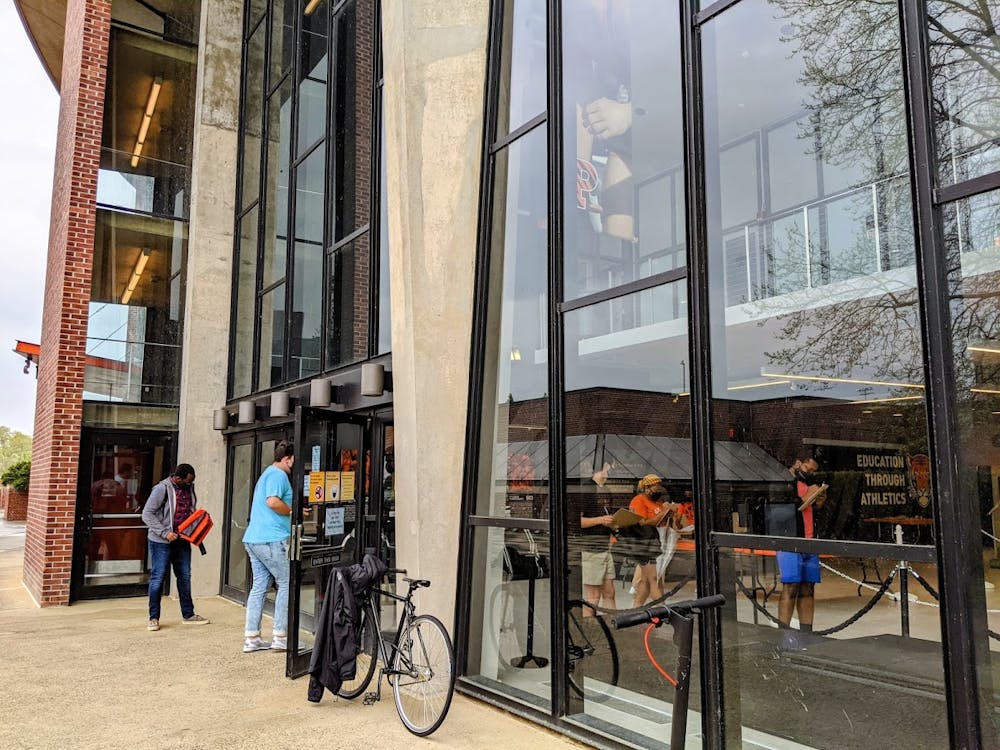The Princeton Health Department, in partnership with University Health Services (UHS), held a student COVID-19 vaccine clinic at Jadwin Gymnasium on Thursday, April 29.
Spots were originally offered to international students, but the clinic was eventually opened to all undergraduate and graduate students eligible under state guidelines. As of April 19, all individuals ages 16 years or older who live, work, or study in New Jersey are eligible for the COVID-19 vaccine.
The one-dose Johnson & Johnson vaccine was administered at Jadwin Gymnasium to students who scheduled an appointment through MyUHS. Students reported having no issues with getting an appointment despite a limited number of available doses.
At Jadwin, students arriving at their scheduled time were directed to a line by the entrance and handed a clipboard with some paperwork. “It was pretty efficient,” explained Jack Bound ’22. “All you had to do is sign a few papers, which is relatively painless as far as things go.”
A number of other students were pleasantly surprised that the vaccination took approximately 15 seconds and found the process to be “swift” and “efficient.” After the vaccine was administered, students were kept for a 15- or 30-minute observation period to ensure they had no adverse or allergic reactions.

One student with their vaccination card and sticker signaling when they were administered the vaccine.
Bhoomika Chowdhary / The Daily Princetonian
Students expressed a number of reasons for getting vaccinated on campus. Almost all of them cited the University’s policy requiring proof of an FDA-approved COVID-19 vaccination in order for students to return to campus in the fall of 2021.
Ivan Ruiz Leon ’23 explained that he believes “it’s our responsibility as a community for herd immunity and everyone's safety to get vaccinated. If the University is providing it, then it’s a win-win situation for everyone.”

Mohamed Alghondakly ’23 also expressed the common sentiment of wanting life to return to normal. Alghondakly said that he “just wanted to get it over with and wanted to have a normal summer.”
Several students expressed gratitude that the University was providing the vaccine for students who wanted to get it but hadn’t yet.
A significant number of students and faculty have already been vaccinated off-campus over the past several months for a number of reasons.
Ethan McAlpine ’21 was able to register for the vaccine through group 1A since his job as an Accessioning Specialist in the Princeton University Clinical Laboratory qualified him as a healthcare worker. He noted that though he has already contracted COVID-19 twice, that is not recognized by the government as immunity, so he decided to get the vaccine for this reason as well.

Jovan Aigbekaen ’23 was able to register for the vaccine in March because his asthma allowed him to qualify as someone with a pre-existing condition.
Julia Garaffa ’23 explained that her aunt, who knew that the Robert Wood Johnson (RWJ) Hospital would have vaccines, encouraged her whole family to pre-register as New Jersey residents in December 2020.
The registration process was not that straightforward for some students. Aigbekaen explained that “booking an appointment was a bit difficult at first.” Initially, he registered “through a system on the state government’s website but heard nothing for two weeks.” After hearing about a Twitter bot account that tweeted information about available vaccine appointments, Aigbekaen was finally able to schedule an appointment in Pennsauken, NJ at the beginning of April.
A significant issue for students who got vaccination appointments off-campus was physically getting to the location, as most students don’t have cars on campus.
Aigbekaen had to travel 34 miles, taking “three different trains and an Uber [on just] the one way journey.” He noted it was “quite hectic” but reasonably affordable.
Garaffa explained that though her vaccine appointment was nearly 40 minutes away, the fact that her family lives 15 minutes away meant that a family member was easily able to drive her to her appointment. She noted that she did have to get permission from her Dean of Student Life to travel off-campus for her appointment.
Students who were vaccinated off-campus got appointments at a variety of locations, with the most common being pharmacies.
Garaffa stated that she was vaccinated through the RWJ Hospital at “an expo center with military presence, so it was very efficient and very spread out.”
Aigbekaen similarly noted that “the check-in was simple and the queue was not long at all so I was in and out within 30 minutes.”
The students who opted to get vaccinated off-campus noted a variety of reasons for getting vaccinated and added benefits of now being vaccinated.
McAlpine expressed his happiness at being able to walk outside without a mask, per the CDC’s new guidelines for vaccinated people. McAlpine is also a member of the Heavyweight Crew Team, which recently began participating in regatta’s locally. He noted that though vaccination isn’t required to participate in the competitions, “we took it upon ourselves to get vaccinated so that we wouldn’t be stopped from competing and we could keep training normally.”
Garaffa explained that she got vaccinated because her family encouraged her to do so.
Aigbekaen articulated the conscientious reason he chose to get vaccinated — a sentiment expressed by many people choosing to be vaccinated.
“I believe that it’s my civic duty. Not only am I protecting myself, but I am also protecting my community members and helping with the effort to return back to pre-pandemic living.”
This article previously stated that students were kept for a 30-minute observation period following vaccination. As instructed by the CDC, individuals with a history of allergic reaction to vaccines, history of anaphylaxis, or contraindictation to mRNA COVID-19 vaccines are observed for 30 minutes, with all other people observed for 15 minutes after vaccination.








